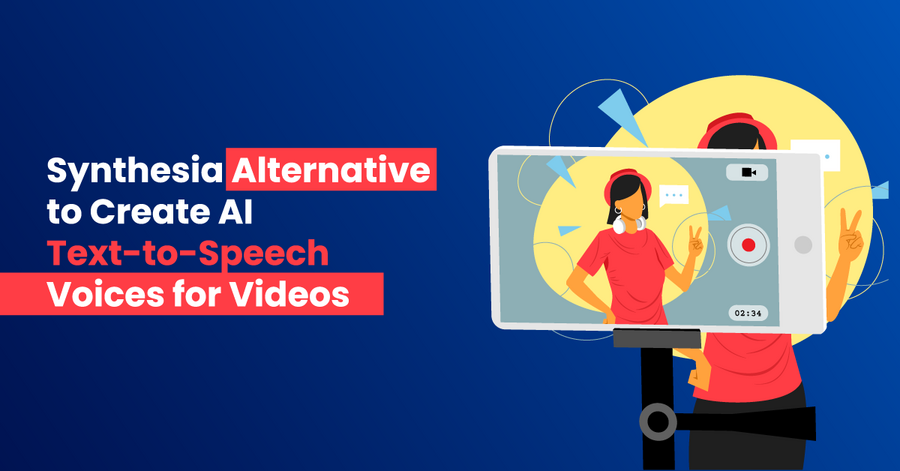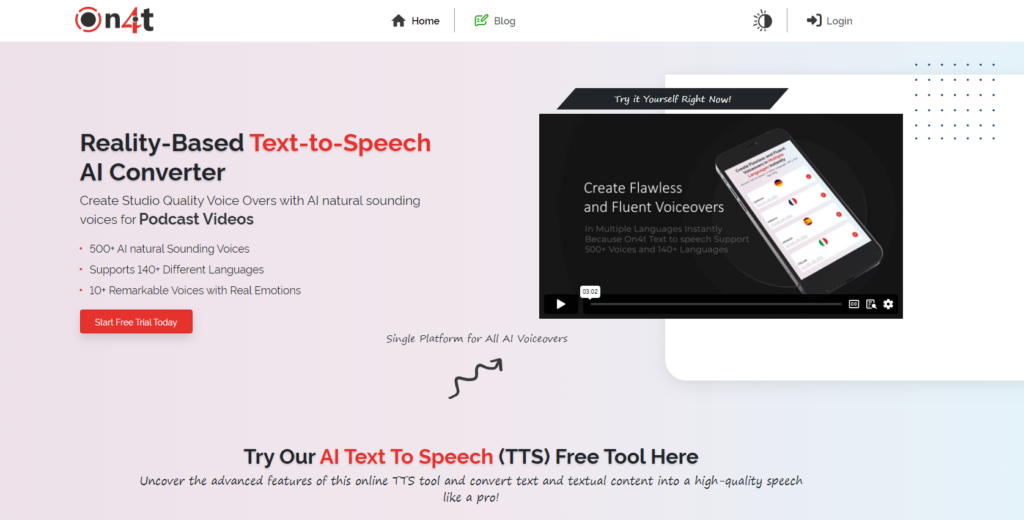Google Speech Synthesis is a text-to-speech service developed by Google using deep neural networks to generate natural-sounding human speech. It can convert text into audio files with customizable voices. However, it has usage limits.
In this article, we will discuss Google Speech Synthesis’s key features for generating AI Voices, pricing model, pros and cons, and some best alternative services worth considering.
Overview of Speech Synthesis

Google Text-to-Speech, also referred to as Google TTS or Google Speech Synthesis, is a cloud service that converts text into human-like speech. It uses advanced deep-learning models to synthesize natural-sounding audio from input text.
The service supports over 100 languages and variants. It provides customizable voice types and speaking styles for more human-like prosody and intonation. Audio outputs can be generated in MP3 and WAV formats.
Google TTS integration is available for developing applications that require text-to-speech capabilities. Overall, it utilizes high-quality neural networks for more realistic voices compared to traditional text-to-speech systems.
Features of Speech Synthesis
Neural2 voices
One of the standout capabilities of Google Speech Synthesis is its Neural2 voices technology. These voices leverage advanced neural network research to achieve incredibly natural and human-like speech output.

The voices can be adapted across languages, allowing for voice customization tailored for international users and localized content. Additionally, Google offers unlimited voiceovers through its text-to-speech API.
Combined with the customizable Neural2 voices, apps and programs can synthesize completely natural-sounding voiceovers for user prompts, narrations, audio guides, and more in a diverse range of languages.
Neural2 voices utilize cutting-edge deep neural network research to achieve the most natural and human-like text-to-speech available. Google continuously trains and optimizes these voices on massive datasets to synthesize speech that mimics real human voices in terms of tone, clarity, pronunciation, and more.
A key advantage is the ability to adapt Neural2 voices to speak different languages fluently while maintaining consistent voice quality and realism. This allows for scalable, customizable speech synthesis across multiple locales.
Neural2 powers exceptional voice realism and cross-language potential to meet rising international demand for localized and humanized text-to-speech.
Studio voices (Preview)
Google offers premium-quality Studio voices for their text-to-speech service. These voices are recorded in professional studio environments by voice actors to capture exceptional clarity, tonality, and human-like prosody.
When synthesized into speech, Studio voices are nearly indistinguishable from real human speech. The studio-grade audio quality enhances applications like audiobooks, documentary narrations, animated videos and more that demand premium voice talent.
Custom Voice
Custom Voice allows users to train unique text-to-speech models using their own voice data. By providing audio samples of your speech, Google’s algorithms can learn the nuances and attributes of your voice to synthesize incredibly realistic speech mimicking your vocal style.
This level of custom, human-like vocalization has tremendous applications across organizations and brands seeking to incorporate their own personalized narration into customer-facing touchpoints.
Adjustments to the trained voice can be made over time as well without re-recording, making Custom Voice scalable and adaptable as an organization’s voice requirements evolve.
Voice tuning
Google Speech enables precise tuning of vocal pitch and speaking rate for further voice customization. Users can adjust pitch up or down by 20 semitones from the original voice to meet specific tone and vocal range requirements.
The speaking rate can also be increased up to 4x faster or slowed down for use cases demanding faster or slower cadences. This granular control over vocal variables allows for voice synthesis that is tailored to specific applications, content styles, or user preferences.
For example, vocal pace could be reduced for digital assistants guiding senior users, while pitch could be lowered for announcements or tutorials requiring an authoritative tone. Overall, strong voice tuning control unlocks flexibility.
Text and SSML support
Google Speech Synthesis allows input text customization with SSML (Speech Synthesis Markup Language). SSML enables precise control over speech output by inserting markup tags for punctuation, pronunciation, pacing, volume, and more.
For example, users can add pauses between sentences, change date and number formatting, emphasize specific words, adjust letter spelling, and apply other vocal instructions.
By using SSML tags in the input text prompt, applications can programmatically direct the speech synthesizer to transform output with advanced vocalizations on demand.
Pros And Cons
Pros
- High-quality, natural-sounding voices
- Support for many languages
- Customizable voices
- Flexible outputs
Cons
- Affordable pricing
- Audio sounds less natural.
- Usage limits
- SSML support still in development
- Privacy concerns due to Google ownership
Best Speech Synthesis Alternative: On4t TTS

On4t TTS is a cloud-based text-to-speech service that suits best Google Speech Synthesis as an alternative. It utilizes advanced AI and neural networks to achieve incredibly realistic and natural-sounding speech synthesis across over 140 languages.
On4t TTS provides studio-quality voices created by AI with high quality for uses like audiobooks or voice assistant development. It also able to fully customize voices easily to make voice perfect for your needs.
On4t TTS challenges Google Speech Synthesis by offering greater voice realism, customization potential, flexible pricing, and customer support.
Features of ON4t TTS Tool
- Over 500 AI natural-sounding voices
- Supports more than 140 languages
- Includes 10+ voices with real emotions
- Allows customization of voice speed, pronunciation, and pitch
- Compatible with multiple accents in English and other languages
- Offers emotional tonality in voices, including happy, sad, whispering, angry, shouting, and confused
- Web-based application, accessible without installation
- Capabilities to merge multiple audio files and create voiceovers.
Pricing
FAQs
What are some major alternatives to Google Speech Synthesis?
Some top alternatives are Amazon Polly, Microsoft Azure Cognitive Services Speech Synthesis, IBM Text to Speech, Lyrebird, and On4t TTS. Each service has its unique strengths.
What file formats does On4t TTS support?
On4t generates speech outputs in common MP3 and WAV formats. It also supports a specialty OGG format suitable for long-form narration.
Which speech synthesis services offer usage limits?
Unlike Google’s limits, solutions like Microsoft Azure and On4t TTS place no hard limits on speech generation volumes, making them more scalable.
Conclusion
As we have reviewed, Google Speech Synthesis has many merits but also practical limitations, especially for large-scale commercial usage. Alternative services like On4t, Amazon Polly, and NaturalReaders may offer more scalability and customization options to meet this enterprise demand.
However, innovative services like On4t TTS show particular promise in advancing both the realism and unlimited use possibilities of artificially generated speech.